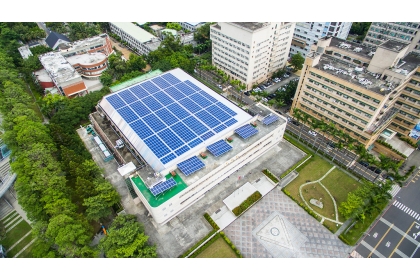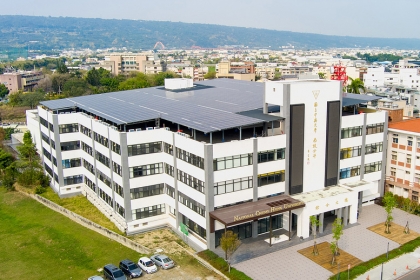National Chung Hsing University (NCHU) Secures NT$100 million Microgrid Subsidy from Taiwan Power Company for Building a Net-Zero Campus
2024-08-12
興新聞張貼者
Unit秘書室
1,820
National Chung Hsing University (NCHU) has been actively promoting energy conservation and establishing a campus microgrid. In July, NCHU stood out among 23 universities nationwide, passing the evaluation of Taiwan Power Company's "University Energy Conservation and Power Resilience Promotion Project" and receiving a NT$100 million subsidy, making it the only university in Central Taiwan to receive this funding. NCHU aims to become a model for net-zero campuses.
A microgrid is a small-scale electrical grid composed of distributed energy sources, energy storage equipment, loads, and an energy management system (including monitoring). It has self-control, protection, and management capabilities and can operate in conjunction with or independently from the main grid. To promote energy conservation, energy creation, and storage on campuses, Taiwan Power Company encouraged universities with electrical engineering departments to propose microgrid projects. This year, one university from each of the northern, central, and southern regions was selected to receive construction funding.
Starting this year, NCHU has planned to invest NT$250 million in promoting campus energy conservation and power resilience. In addition to the NT$100 million subsidy from Taiwan Power Company, another NT$150 million, comprising government subsidies and the university's own funds, will be allocated to projects such as replacing energy-efficient air conditioners, installing smart streetlights, building charging stations, and establishing microgrids at both the main campus and the Nantou branch. NCHU will use solar and biomass energy as power sources. Besides self-consumption, the university also plans to apply for renewable energy certificates at the Nantou branch. It is estimated that after the microgrid is established, it could generate over NT$60 million in annual revenue, providing sustainable energy for the campus.
NCHU’s General Affairs Director, Tsai Kang-ting, stated that the main campus is actively developing renewable energy by leasing rooftop space for the installation of solar photovoltaic systems, with a total installed capacity of approximately 3,300 kilowatts (kW). After the microgrid is established, it is expected that the university can reduce its contracted capacity by 1,000 kW, saving approximately NT$54 million in electricity costs annually. This will also help alleviate the capacity pressure on Taiwan Power Company's grid.
At the Nantou branch, solar panels have already been installed on several buildings, with a planned generation capacity of 800 kW per hour. Additionally, the abundance of trees in the Chung-Hsing New Village area has historically posed challenges for the disposal of fallen branches and leaves. In the future, NCHU will use the Taiwan Power Company subsidy to establish biomass energy generation and storage systems at the Nantou branch, capable of processing 4 tons of fallen branches and leaves daily, with a generation capacity of 600 kW per hour. The university hopes to increase the generation capacity to 2,000 kW within two years, achieving self-sufficiency in campus electricity and moving toward the goal of a zero-carbon campus.
A microgrid is a small-scale electrical grid composed of distributed energy sources, energy storage equipment, loads, and an energy management system (including monitoring). It has self-control, protection, and management capabilities and can operate in conjunction with or independently from the main grid. To promote energy conservation, energy creation, and storage on campuses, Taiwan Power Company encouraged universities with electrical engineering departments to propose microgrid projects. This year, one university from each of the northern, central, and southern regions was selected to receive construction funding.
Starting this year, NCHU has planned to invest NT$250 million in promoting campus energy conservation and power resilience. In addition to the NT$100 million subsidy from Taiwan Power Company, another NT$150 million, comprising government subsidies and the university's own funds, will be allocated to projects such as replacing energy-efficient air conditioners, installing smart streetlights, building charging stations, and establishing microgrids at both the main campus and the Nantou branch. NCHU will use solar and biomass energy as power sources. Besides self-consumption, the university also plans to apply for renewable energy certificates at the Nantou branch. It is estimated that after the microgrid is established, it could generate over NT$60 million in annual revenue, providing sustainable energy for the campus.
NCHU’s General Affairs Director, Tsai Kang-ting, stated that the main campus is actively developing renewable energy by leasing rooftop space for the installation of solar photovoltaic systems, with a total installed capacity of approximately 3,300 kilowatts (kW). After the microgrid is established, it is expected that the university can reduce its contracted capacity by 1,000 kW, saving approximately NT$54 million in electricity costs annually. This will also help alleviate the capacity pressure on Taiwan Power Company's grid.
At the Nantou branch, solar panels have already been installed on several buildings, with a planned generation capacity of 800 kW per hour. Additionally, the abundance of trees in the Chung-Hsing New Village area has historically posed challenges for the disposal of fallen branches and leaves. In the future, NCHU will use the Taiwan Power Company subsidy to establish biomass energy generation and storage systems at the Nantou branch, capable of processing 4 tons of fallen branches and leaves daily, with a generation capacity of 600 kW per hour. The university hopes to increase the generation capacity to 2,000 kW within two years, achieving self-sufficiency in campus electricity and moving toward the goal of a zero-carbon campus.



